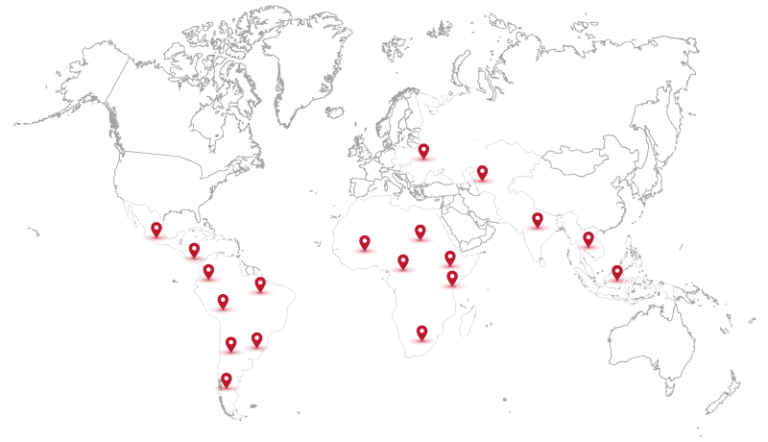- HomeNet Kenya hosts HomeNet International’s first Strategic Planning Meeting and prepares the way for HNI’s 4-Year Plan.
- HNI’s recently launched global advocacy campaign for HBWs rights and the current key activities and programmes – such as the Access to Markets Programme – will also be discussed.
November 8th, 2023. HomeNet International (HNI), the global network of membership-based workers’ organisations representing more than 1.2 million home-based workers from around the world – 95% of which are women – is holding its first strategic planning meeting in Nairobi, Kenya. This meeting is expected to have a significant impact on the future of the organisation as its direction and priorities will be established.
HNI aims to raise visibility and gain recognition of home-based workers as workers globally, and works with its affiliates around the world to develop effective mechanisms to improve the livelihoods and working conditions of home-based workers.
HomeNet Kenya (HNK), an association of membership-based organisations representing home-based workers in Kenya and an HNI affiliate, has taken the lead in hosting the session and welcomed the first HNI Executive Committee to Nairobi.
HNI ExCo members, made up of home-based worker leaders from around the world, flew in from the five regions where HNI has representation – Latin America, South Asia, Southeast Asia, Eastern Europe and Central Asia and Africa – and together will collaboratively discuss HNI’s priority areas of work, develop a 4-year plan and create a roadmap.
Who are Home-based Workers?
Home-based workers (HBWs) are workers who do remunerative work from in and around their own homes, producing goods and/or providing services. HBWs make diverse and significant contributions to their households as well as to the local and global economy. However, despite their many contributions they remain invisible and unrecognised.
In 2019, before the COVID-19 pandemic, drawing on household surveys of 118 countries, the International Labour Organisation (ILO) estimated that there are approximately 260 million home-based workers worldwide, 147 million (57%) are women, who juggle their remunerative work alongside the burden of domestic and care responsibilities– while also dealing with low wages, lack of social protection, and poor working conditions.
Advocating for a Policy on HBWs Rights in Kenya
In 2019, the International Labour Organisation (ILO) reported that there are approximately 260 million home-based workers globally, with 57% being women who juggle their remunerative work alongside the burden of domestic and care responsibilities – while also dealing with low wages, lack of social protection, and poor working conditions.
According to Janhavi Dave, HNI International Coordinator, “These figures emphasise the pressing need for home-based workers to be recognised as workers and for governments to create policies, laws and/or guidelines that protect them. Consequently this year the HNI ExCo reflected upon the urgent need for countries to start taking the necessary steps to ratify the International Labour Organisation’s Home Work Convention, 1996 (No. 177) and Recommendation (No. 184), which aims to to improve the working conditions of homeworkers.”
The Convention calls upon governments to adopt and implement a national policy on home work, in consultation with employers and worker unions. The national policy must ensure that homeworkers receive the same treatment as other wage earners while considering the unique nature of home work. However, with home-based work on the rise, it is sad to observe that as of 2023 only 13 countries have ratified ILO C177.
After seeking inputs from HNI affiliate organisations, the ExCo concluded that the reality of each country must be considered and an unique approach in every country would be required for the global campaign. As a result a broader and more inclusive goal was established for the campaign:
For participating countries to achieve labour rights, social protection and decent work for home-based workers.
The campaign, which was launched during a special HNI webinar on October 20th, 2023, in celebration of International Home-based Workers Day, will take place over the course of four years, with 13 countries of HNI Affiliates currently on board.
HomeNet Kenya has taken the initiative to participate in HNI’s Global Campaign and will be seeking to advocate in Kenya for a policy which protects home-based workers’ rights.
HBWs Urgently Need Access to Markets
The COVID-19 pandemic’s impact was profound for HBWs in Kenya and worldwide, with reduced sales and income, disrupted supply chains, and skyrocketing production expenses. In response to this, one of HNI’s key activities for 2023 was to develop a programme to increase visibility of the products made by HBWs and provide networking opportunities at the global level.
This activity took the form of a HBWs online Bazaar, a symbol of hope and solidarity for HBWs and a call to action for everyone to support HBWs in their journey towards economic recovery.
The microsite provides access to HNI Affiliates’ online shops, showcasing their products, and shares the contact information of the organisation where one can purchase or place an order for their products. It is a platform that promotes HBWs and their work, and encourages visitors to support their businesses and livelihoods. To visit HomeNet Kenya’s dedicated page on the HNI Bazaar, click here.
About HNI
HomeNet International is a global network of membership-based workers’ organisations. In February 2021, 36 HBW organisations from 20 countries became the first affiliate members to join the organisation. Today, HNI is made up of 75 affiliate organisations from 33 countries from Latin America, Africa, South Asia, SouthEast Asia and Eastern Europe and Central Asia. We now collectively represent over 1.2 million home-based workers, of which approximately 95 percent are women.



